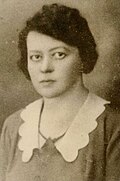Moyshe Shimel (Maurycy Szymel)
Don’t cry little boy, wipe away your tears, it will soon be good.
We will heal the wounds that drip with blood.
We stand alone in this wide world against the sun that sets
Alone, alone with our pain and our poverty
We must find consolation for me and for you
And repair the walls and fix the door ourselves
Let them frighten us with knives, beat us and rob
We will patch up our pillows and fix our windows
Once and twice and three times we were fooled
We have time and patience, we can wait
Don’t cry little boy wipe away your tears and be still
We’ll fix the table, the chairs and the floor
We’ll restore the house that they have burned
New walls will shine white in the light of the sun
Don’t cry little boy, clear your eyes for new brighter days
Spring will find us and come back this way
Because they will be chopped down like old rotten trunks
The hands of those who have killed your father and mother
1937
(more…)
